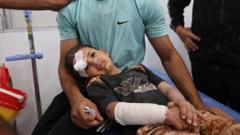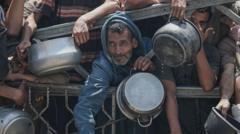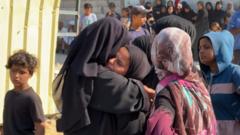Dr. Tedros Adhanom Ghebreyesus highlights damages to medical facilities, severe shortages, and urgent calls for international intervention to protect Gaza’s healthcare infrastructure.
**Gaza's Healthcare System on the Brink Amid Intensified Israeli Operations, WHO Reports**

**Gaza's Healthcare System on the Brink Amid Intensified Israeli Operations, WHO Reports**
The World Health Organization warns of a critical health crisis in Gaza as hospitals face unprecedented challenges.
The ongoing Israeli military operations in Gaza are pushing the territory's healthcare system into a critical state, as reported by the World Health Organization (WHO). Dr. Tedros Adhanom Ghebreyesus stated that numerous hospitals, including the Indonesian, Kamal Adwan, and al-Awda facilities, are either directly impacted by hostilities or face forced evacuations due to new military zones.
In particular, Kamal Adwan Hospital has had to cease operations due to ongoing conflicts in close proximity, while access to the Indonesian hospital remains severely restricted because of the heavy presence of Israeli troops. Dr. Mohammed Salha, the director of al-Awda hospital, described it as "totally under siege," indicating that helplessness prevails as patients cannot be admitted or evacuated due to constant danger.
The Israeli Defense Forces (IDF) maintain they are targeting terror-related sites in the vicinity but deny any siege on the hospitals. Dr. Tedros emphasized that even uninterrupted facilities are hindered by the surrounding conflict, complicating patient access and supplies, with reference to previous situations where health systems were neglected amidst warfare.
Médecins Sans Frontières (MSF) reported that over 20 medical facilities have seen damage or operational delays due to recent Israeli ground operations and airstrikes following a resumed military offensive after a brief ceasefire. MSF has condemned the actions leading to what they describe as the "deliberate asphyxiation of Gaza."
Since hostilities escalated, over 600 fatalities and thousands of injuries have been recorded in Gaza, with civilian displacement reported on an alarming scale. Israeli Prime Minister Benjamin Netanyahu indicated that limited food supplies would be permitted into Gaza to help mitigate famine risks, although aid shipments have not matched the growing humanitarian needs.
WHO's representative for Palestinian territories, Dr. Rik Peeperkorn, provided a grim assessment following a visit to Gaza, noting an extreme depletion of medical supplies and an overwhelming number of urgent cases. He voiced particular concern for the almost abandoned Indonesian hospital, which has lost most of its medical staff and patients due to security threats.
Highlighting an urgent lack of resources, medical facilities are facing crises in essentials like food and water, intensified by attacks that have targeted ambulances and other healthcare vehicles. The plight in Gaza is compounded by the severe disruption to basic healthcare and the challenges of providing emergency care amid increasing military hostilities.
The IDF insists its operations abide by international law, asserting that hospitals lose their protection under specific conditions, which they claim have been breached by Hamas actions. The situation remains dire as the humanitarian crisis escalates, fueling calls for immediate action from global leaders to safeguard the integrity of Gaza's healthcare amidst ongoing conflict.
In particular, Kamal Adwan Hospital has had to cease operations due to ongoing conflicts in close proximity, while access to the Indonesian hospital remains severely restricted because of the heavy presence of Israeli troops. Dr. Mohammed Salha, the director of al-Awda hospital, described it as "totally under siege," indicating that helplessness prevails as patients cannot be admitted or evacuated due to constant danger.
The Israeli Defense Forces (IDF) maintain they are targeting terror-related sites in the vicinity but deny any siege on the hospitals. Dr. Tedros emphasized that even uninterrupted facilities are hindered by the surrounding conflict, complicating patient access and supplies, with reference to previous situations where health systems were neglected amidst warfare.
Médecins Sans Frontières (MSF) reported that over 20 medical facilities have seen damage or operational delays due to recent Israeli ground operations and airstrikes following a resumed military offensive after a brief ceasefire. MSF has condemned the actions leading to what they describe as the "deliberate asphyxiation of Gaza."
Since hostilities escalated, over 600 fatalities and thousands of injuries have been recorded in Gaza, with civilian displacement reported on an alarming scale. Israeli Prime Minister Benjamin Netanyahu indicated that limited food supplies would be permitted into Gaza to help mitigate famine risks, although aid shipments have not matched the growing humanitarian needs.
WHO's representative for Palestinian territories, Dr. Rik Peeperkorn, provided a grim assessment following a visit to Gaza, noting an extreme depletion of medical supplies and an overwhelming number of urgent cases. He voiced particular concern for the almost abandoned Indonesian hospital, which has lost most of its medical staff and patients due to security threats.
Highlighting an urgent lack of resources, medical facilities are facing crises in essentials like food and water, intensified by attacks that have targeted ambulances and other healthcare vehicles. The plight in Gaza is compounded by the severe disruption to basic healthcare and the challenges of providing emergency care amid increasing military hostilities.
The IDF insists its operations abide by international law, asserting that hospitals lose their protection under specific conditions, which they claim have been breached by Hamas actions. The situation remains dire as the humanitarian crisis escalates, fueling calls for immediate action from global leaders to safeguard the integrity of Gaza's healthcare amidst ongoing conflict.




















